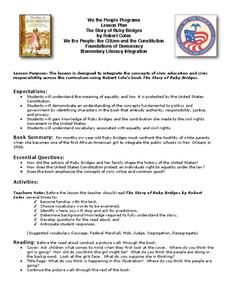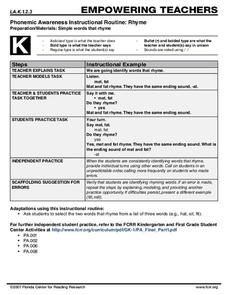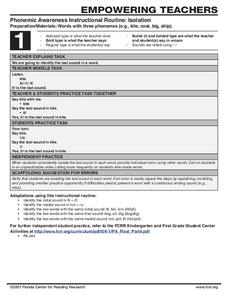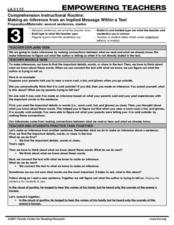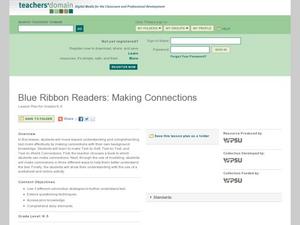Curated OER
We the People: The Citizen and the Constitution
Robert Coles’ The Story of Ruby Bridges forms the basis of this powerful cross-curricular study of civic education and civic responsibility. Class members consider how the book presents authority, responsibility, justice, and privacy.....
Curated OER
Giving Thanks for Food and Farms
Sarah Stewart’s The Gardener and Food from Farms by Nancy Dickmann display the importance of community farms. After reading these short picture books, class members draw connections between farms and the food we eat each day. As a...
Curated OER
Introduce: Comparison and Contrast
Class discussions can really make concepts come to life. The class discusses the differences between compare and contrast, read a book, then talk about ways they can compare events or characters in the story. Good leading question are...
Florida Center for Reading Research
Alphabet Borders
Help young scholars name the letters of the alphabet. They use the provided alphabet border and letter cards to take turns saying and finding various alphabet letters. This simple game can be extended by having learners focus on the...
Curated OER
Pasta Names
Helps learners recognize alphabet letters by having them glue dry pasta over their names. Scholars use a card with their names printed neatly, then decorate it with noodles while saying each letter they make.
Florida Center for Reading Research
Phonics: Letter Recognition, Lettercritter
This is a fun idea to get your scholars practicing their ABCs! They assemble an alphabet caterpillar, printing lowercase versions below each uppercase letter. They practice writing the lowercase letters using dry-erase markers and say...
Florida Center for Reading Research
Phonics: Letter-Sound Correspondence, Medial Phoneme Spin
A collaborative activity challenges young scholars to match medial graphemes and phonemes. Pairs take turns spinning the spinner, naming the letter, and saying its name. They choose from a stack of cards with the same medial sound.
Florida Center for Reading Research
Fluency: Letter Recognition, Speedy Alphabet Arc
On your mark, get set, match! Learners use a complete set of letters, matching each to its outlined letter on an arc. As they choose letters, they name them aloud. For added difficulty, another arc is missing most of its letters to...
Florida Center for Reading Research
Rhyme or No Rhyme
Scholars listen to a rhyming song, clap when they hear a rhyme, and shake their heads when they don't. They then draw a pair of objects that rhyme.
Florida Center for Reading Research
Phonological Awareness: Rhyme, Rhyme or No Rhyme
Rhyming is fun, builds phonemic awareness, and is a tried and true pre-reading skill. This activity helps learners identify words that rhyme. Young scholars listen to a song, locate a rhyming word they hear by clapping then draw a...
Florida Center for Reading Research
Phonological Awareness: Onset and Rime, Guessing Game
An activity challenges scholars to show what they know about onset and rime. Learners choose from a stack of picture cards and give onset and rhyming clues to see if their partners can guess the word they are holding.
Florida Center for Reading Research
Phonological Awareness: Phoneme Segmenting, Phoneme Hopscotch
Your class will love playing phoneme hopscotch! Scholars choose a card, say the name of the object on the card, break the word into phonemes, count the phonemes, then hop that many spaces on the hopscotch mat. Super fun!
Florida Center for Reading Research
Phonemic Awareness Instructional Routine: Rhyme
As a class, kindergarteners identify rhyming words. The teacher provides an example of a rhyming pair and explains why they rhyme. Individual learners then respond by saying a word that rhymes with a given word.
Curated OER
Phonemic Awareness Instructional Routine: Isolation
This phonemic awareness activity would be great for morning meeting or circle time. Teacher calls out a word, s/he identifies the final phoneme. The class then take turns saying other simple or cvc words that also have the same ending...
Curated OER
Phonics Instruction: Writing Simple Words
Sound it out, read it, then sound it out, and write it. Little ones work as a class to sound out simple words. After they have sounded out each word they will write that word on the white board. This is a great way to build a connection...
Curated OER
Comprehension: Identify Story Grammar
This fully scripted lesson could be a big help for someone new to teaching Kindergarten. It outlines what you should do and say as you teach grammar and literary elements such as, main character, setting, and events through reading. The...
Curated OER
Asking and Answering Lower-Level Questions
Help your kindergartners with reading comprehension using this simple sentence strips approach. They answer basic questions about a simple sentence, determining the who and what of the story. Use the graphic organizer during whole-class...
Curated OER
Listening Comprehension: Answering High Level Questions
Kndergarteners work to build strong listening and reading comprehension skills by answering higher level questions. After a teacher demonstration of the task, learners listen to the story The Three Little Pigs, the teacher asks them...
Curated OER
Listening Comprehension: Retell Main Events of a Story
Story retell is a very important skill. Little learners use a story map and a previously heard story to walk through the retell and story sequencing process. They complete this activity as a whole class and then on their own.
Curated OER
Making an Inference from an Implied Message Within a Text
Show your scholars that they make inferences every day and might not even know it. Through scaffolded instruction, they break down the process of drawing information from context. Using example sentences and didactic questioning,...
Curated OER
Identify Base Words and Suffixes to Read Multisyllabic Words #1
Show your scholars how adding an affix changes the entire meaning of a word; they focus on the suffix -able. You'll find a complete script here, but if you don't want to read this verbatim, use it simply as an outline. Learners watch you...
PBS
Blue Ribbon Readers: Determining Important Ideas
Brenda Z. Guiberson’s nonfiction book, Cactus Hotel, launches a series of activities that model for readers how to determine the main idea in a passage. Class members engage in an online interactive game to test their understanding. The...
Curated OER
Blue Ribbon Readers: Making Connections
Model for young readers how to make the shift from passive to active reading by making text-to-self and text-to-text connections. After a series of activities that provide guided practice, the focus shifts to making text-to-words...
Curated OER
Blue Ribbon Readers: Monitoring and Repairing
An online interactive activity encourages young readers to employ the monitoring/repairing strategy to become better readers. Class members identify unfamiliar words, decode them, and use them in other contexts.
Other popular searches
- 5th Grade Language Arts
- 3rd Grade Language Arts
- 4th Grade Language Arts
- Second Grade Language Arts
- English Language Arts
- 1st Grade Language Arts
- Kindergarten Language Arts
- Language Arts Jeopardy Game
- First Grade Language Arts
- Language Arts School Projects
- Language Arts Lesson Plans
- Language Arts Games


